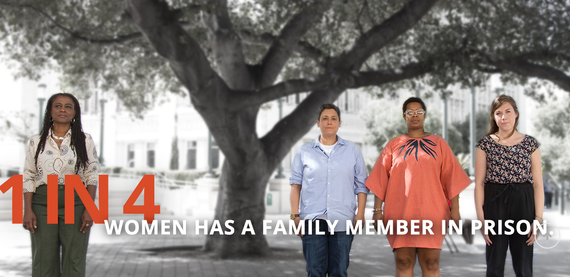
In 2013, The Sentencing Project, a group aimed at exposing the horrendous facts behind mass incarceration in the U.S., published the following information:
If incarceration rates continue to grow at the pace they have since the 1970s, 1 of every 3 Black American males born today can expect to go to prison in his lifetime, as can 1 of every 6 Latino males, and 1 of every 17 White males.
This alarming disproportionate effect on men of color is frustratingly unjust, yet something that is missing in this statistic and much of the information the public receives on mass incarceration, is its effect not only on the men behind bars but also on the women, especially women of color.
While men of color are the group most affected, in order to address the full scale of devastation that mass incarceration carries, one must also consider the wives, partners, and families that are put in a different kind of captivity. In short, mass incarceration is not only about injustice towards inmates, it is also about the myriad of lives that are affected as a result.
What happens to the partners of people behind bars? What happens to their families? When such questions are considered, the magnitude of the injustice of mass incarceration and its connection to other forms of social inequalities becomes more accurate and even more concerning.
One woman who takes it upon herself to address these questions is Gina Clayton, a USC and Harvard Law graduate who has dedicated her work to helping women experiencing the devastating impact of mass incarceration. After working with women who had loved ones behind bars and were facing eviction in Los Angeles and Harlem, Clayton noticed a problem in the way we typically talk about this issue. She says she was "struck" by "not only the financial, but the psychological impact that incarceration of a loved one had on women's lives." She states:
Though perhaps unfair, women more than men are moral standard bearers, the natural caretakers, the stewards of family health and emotional well-being. This resulted in women suffering profound isolation and depression following the incarceration of a loved one. Women were not only suffering from the grief accompanying the removal of a loved one, they were suffering because they felt that they had failed as mothers, grandmothers, daughters, sisters, girlfriends, and wives' (Women's Foundation of California).
In 2014 she founded the Essie Justice Group to "harness the collective power of women with incarcerated loved ones to empower women and end mass incarceration." Essie trains women who are affected and gives them a space to be advocates against this horrendous reality of discriminatory policing and sentencing.
On the Essie homepage, you can find the following statistics that guide the group's mission -
With an unprecedented 2+ million people living behind bars in the United States - 90% of them men - millions of women with incarcerated loved ones are left behind. Today 1 in 4 women and nearly 1 in 2 Black women has a family member in prison.
The group launched a new campaign this past week called #StandWithHer in order to gain more public awareness for their cause. The campaign has already garnered support with board member Michelle Alexander, the author of The New Jim Crow, standing behind it alongside Piper Kerman, the author of Orange is The New Black. Google has also chosen Essie Justice Group as a Top Ten finalist for its Google Impact Challenge. If Essie can make it into the top 4 projects by October 20th they will receive a $500,000 grant and greatly multiply their current reach.
In short, the injustice of mass incarceration is something everyone should be aware of and talking about. The impact it is having not only on inmates but also on their partners and families is a discussion we cannot continue to leave out. Gina Clayton is a name that people should become familiar with as she has no intension of stopping her mission anytime soon, and Essie is a group that should be supported for it is already moving closer to a solution for this horrendous issue by presenting a more accurate and encompassing picture of the problem.

